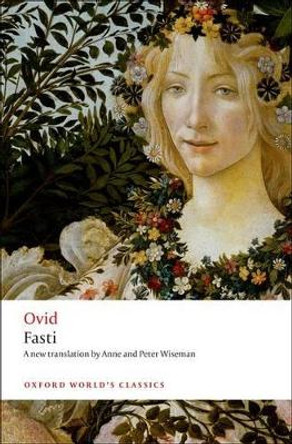Description
The Roman book of days.
Ovid (Publius Ovidius Naso, 43 BC-AD 17), born at Sulmo, studied rhetoric and law at Rome. Later he did considerable public service there, and otherwise devoted himself to poetry and to society. Famous at first, he offended the emperor Augustus by his Ars amatoria, and was banished because of this work and some other reason unknown to us, and dwelt in the cold and primitive town of Tomis on the Black Sea. He continued writing poetry, a kindly man, leading a temperate life. He died in exile.
Ovid's main surviving works are the Metamorphoses, a source of inspiration to artists and poets including Chaucer and Shakespeare; the Fasti, a poetic treatment of the Roman year of which Ovid finished only half; the Amores, love poems; the Ars amatoria, not moral but clever and in parts beautiful; Heroides, fictitious love letters by legendary women to absent husbands; and the dismal works written in exile: the Tristia, appeals to persons including his wife and also the emperor; and similar Epistulae ex Ponto. Poetry came naturally to Ovid, who at his best is lively, graphic and lucid.
The Loeb Classical Library edition of Ovid is in six volumes.
About the Author
Sir James George Frazer (1854-1941) was Fellow in Classics at Trinity College, Cambridge and an important figure in the development of modern social anthropology. G. P. Goold was William Lampson Professor of Latin Language and Literature at Yale University, and General Editor of the Loeb Classical Library (1974-1999).
Book Information
ISBN 9780674992795
Author Ovid
Format Hardback
Page Count 496
Imprint LOEB
Publisher Harvard University Press
Weight(grams) 354g









